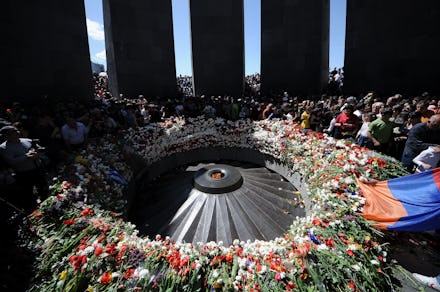Obama's Refusal to Call the Murder of 1.5 Million Armenians "Genocide" Is Reprehensible

In January 2008, then-Sen. Barack Obama released a now-deleted statement declaring the slaughter of hundreds of thousands of Armenians by the Ottoman Empire to be an act of genocide. "The facts are undeniable. An official policy that calls on diplomats to distort the historical facts is an untenable policy. As a senator, I strongly support passage of the Armenian Genocide Resolution ... and as president I will recognize the Armenian genocide."
Seven years after those comments, and a century to the date since the beginning of the Armenian genocide, Obama has broken that promise. Instead of denouncing the slaughter of up to 1.5 million people, the Obama administration has taken its own untenable position: stating that the president's view of "what occurred in 1915" has not changed but refusing to use the word "genocide."
Armenian-American activists had hoped that the 100-year anniversary of the genocide's commencement might push Obama to label the crimes a genocide. That hope, it appears, was misplaced. Instead, the White House has doubled down on appeasing defenders of war crimes, an erasure of the suffering of millions of ethnic Armenians and their ancestors.
A century's worth of denial: The Armenian genocide, known to modern-day Armenians around the world as Medz Yeghern, or the "Great Crime," was the systematic disenfranchisement, deportation and extermination of the Ottoman Empire's Armenian subjects. Armenians, a Christian minority group that had previously faced institutionalized discrimination from the Ottoman Empire for more than a century, traditionally mark the beginning of the genocide on April 24, or "Red Sunday," the date when the first of thousands of Armenian community leaders were deported from Constantinople (now Istanbul) and sent to their deaths on the eve of World War I.
The genocide began with the murder of hundreds of thousands of Armenian men through the use of mass burnings, drownings and firing squads. The men who weren't murdered outright were worked to death as slave labor in the service of the sultan's army. Remaining Armenian women, children and the elderly were forced into "death marches" to the Syrian desert, deprived of food and water and subjected to frequent rape, robbery and random acts of murder.
Raphael Lemkin, the Polish lawyer who first coined the term "genocide," has described the slaughter of the Armenian people by the Ottoman Empire as the "destruction of entire nations, and ethnic and religious groups" that constitutes genocide. This opinion has been held to be true by the vast majority of genocide scholars in decades since.
Why won't the United States call it genocide? Turkey, the so-called "successor state" to the Ottoman Empire, has not denied the events of Medz Yeghern in their entirety. Ahead of the 99th anniversary of "Red Sunday" in 2014, Recep Tayyip Erdogan (then prime minister, now president of Turkey) called the massacre of Armenians under the Ottoman Empire "inhumane."
In a statement, Erdogan declared that the crimes suffered on both sides of World War I "should not prevent Turks and Armenians from establishing compassion and mutually humane attitudes among towards one another." But admitting that Armenians suffered under the sultan is a very different thing from labeling the massacres a "genocide." (And, in response to Erdogan: If it walks like a genocide, talks like a genocide and sounds like a genocide, it's a genocide.)
Although Turkey is a distinct political entity from the Ottoman Empire, an admission of the specific crime would open the nation to potential lawsuits, yet chillier relations with present-day Armenia and even charges in the International Court of Justice. Turkey's official position is that, since genocide only became a "crime" following World War II, it cannot be held retroactively accountable.
Twenty-four other nations have disagreed, as well as 43 U.S. states, all of which have passed resolutions or made declarations labeling the massacre of Armenians by the Ottoman Empire to be a genocide. But, with the exception of Ronald Reagan, no modern president has referred to it as such.
Why not? Because doing so would mean alienating one of America's few allies in the Middle East at a time when Turkey's membership in NATO represents one of the few bulwarks against religious and totalitarian extremism in the region. In addition to Obama's inherited wars in Afghanistan and Iraq, (the latter of which sits on Turkey's southern border), Russia's imperialist impulses and the rise of the Islamic State group represent threats to American interests abroad too precious to endanger in the name of appeasing a few million Armenians.
This year, however, Armenian activists had hoped that the centennial would be enough to push Obama into finally say the G-word — again. If Pope Francis is willing to do it, and the president of Germany is willing to do it and Sen. Ted Cruz is willing to do it, why isn't Obama?
Once again, "political realities" stand in the way of justice. From "evolving" on the issue of marriage equality to his love-me-love-me-not approach to a public option in the Affordable Care Act, Obama has time and again demonstrated a tendency to split the difference on controversial issues. In attempting to placate parties on either side of the debate, however, he has simply entrenched his opponents and alienated the people who agree with him. On an issue as potent as recognition of a century-old genocide, using code terms like "massacre" and "atrocity" aren't enough to appease anymore.
During a visit to Israel in 2013, a visibly moved Obama signed a guestbook at the Yad Vashem memorial to the 1.5 million children murdered during the Holocaust. In a speech thereafter, he vowed "never again." But for the Armenian diaspora, there is no such assurance. It's hard to say "never again" when you refuse to admit genocide occurred in the first place.